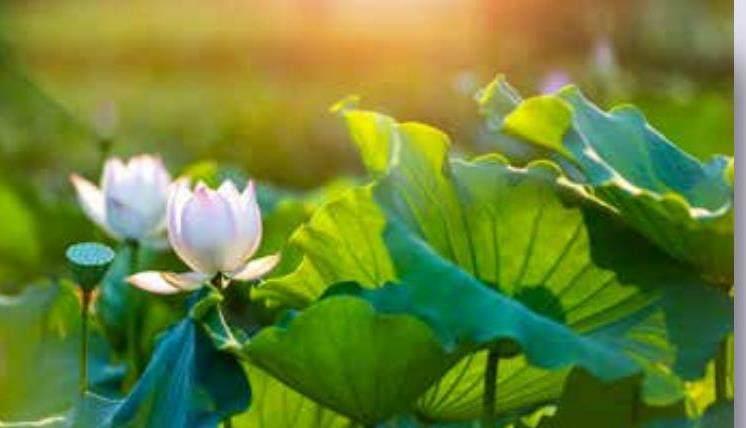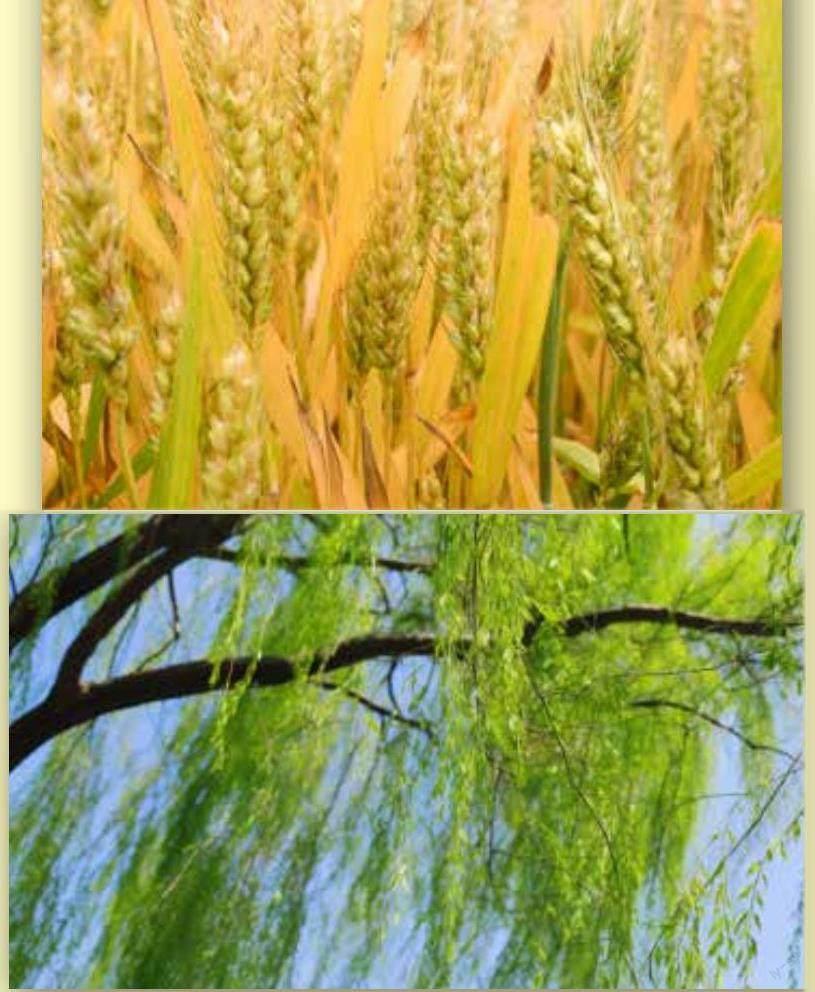二十四节气
2023-12-25张建军
张建军



立夏
立夏,是夏季的首个节气,标志着春天结束、夏季开始,万物由“春生”转入“夏长”阶段。“夏”字有“物之壮大”的含义,步入立夏节气,“成长”成为生命的主旋律。
Lixia, or the Beginning of Summer, isthe first solar term of summer, marking theend of spring and the beginning of summer.It signifies the transition from “spring birth”to “summer growth”, as represents theflourishing of all things. With the arrival ofLixia, “growth” becomes the main theme of life.
送春迎夏,是立夏节气的传统民俗活动。浙江杭州地区的半山立夏习俗延续千年,有立夏祭祖、娘娘诞庙会、吃乌米饭等活动,这些传统民俗活动同时融入了“跑山”等现代文体活动,彰显着人们千百年来祈福纳祥、追求美好生活的愿望。
Sending oth spring and welcoming summeris a traditional folk activity during the Lixiaperiod. In Banshan region in Hangzhou,Zhejiang Province, the custom of celebratingLixia has been passed down for thousands ofyears. As part of this traditional celebration,people hold ancestral worshipping ceremonies,organize temple fairs honoring the birth ofGoddess Banshan, and eat Umi Rice (glutinousrice cooked with the juice squeeze out ofthe leaves of sea bilberries). Now in the newera, more contemporary activities such as(literally meaning mountain running,the activity of picking wild vegetables in themountain) has been added to the celebration.these activities are the manifestation of people’sdesire for blessings and a better life, which hasbeen passed for centuries.
夏季暑濕,易引发睡眠不佳、乏力倦怠、食欲减退等症状。江南地区流传着“立夏称人”的习俗——司秤人一边打秤花,一边说吉利话,祝福称重人身强体壮、不消瘦。
the summer season is hot and humid, which can leadto discomfort such as poor sleep, fatigue, and reducedappetite. In the Jiangnan region (the region to the south ofthe lower reaches of the Yangtze River), there is a customcalled “Weighing on the Beginning of Summer”, wherepeople get weighed while being blessed on this particularday. The auspicious words spoken are usually about themaintenance of a good health and much strength and theavoidance of unhealthy weight loss.
立夏是尝新、尝鲜的时节。长三角地区,人们多取青嫩麦穗,碾粒作细条食之,因其形状如蚕,故称“麦蚕”,是一种给孩子充饥、解馋的立夏食物。人们还以金花菜掺和米粉摊作饼,或油煎、或蒸煮食之,称“草头摊粞”,以防病驱灾。北京苏家坨镇流传着喝立夏粥的风俗,认为喝了立夏粥可保四季平安,祛病免灾。
Lixia is a time for trying new things and enjoying freshproduce. In the Yangtze River Delta region, people oftentake young wheat ears, grind them into thin strips, andeat them. Because their shape resembles silkworms, theyare called “wheat silkworm”, a snack enjoyed during thisparticular time of year that helps children satisfy hunger andcravings. People also make pancakes by mixing burcloverwith rice noodles, frying or steaming them. This dish iscalled “crushed rice with burclover”, believed to have thebenetht of othering protection against diseases and disasters.In Sujiatuo Town, Beijing, there is the custom of drinkingporridge during the Lixia period. It is said to have the powerof bringing peace throughout the four seasons and wardingoth illnesses.
立夏节气的饮品同样别具风格。茶饮,有著名的“七家茶”,合七家茶米食之,可不病暑。酒饮,极具特色的是“驻色酒”,即兑李汁的酒,立夏日饮此酒,可使人容颜不衰。
The beverages during the Lixia period have theirown unique styles as well. For tea, there is the famous“sevenhousehold tea”, a combination of tea leaves collectedfrom neighbors and friends, which is believed to be helpful to the prevention of heat-related illnesses.As for alcoholic drinks, the distinctive“complexion-maintaining wine”, made bymixing plum juice with wine, can keep aperson’s complexion radiant when consumedduring the Lixia period.
送春迎夏,四时佳兴。宋代文人范成大《四时田园杂兴· 其二十五》有云:
By sending off spring and welcomingsummer, people witness the spinning of thefour seasons, each of which is fascinating in itsown way. In the Song Dynasty, the poet FanChengda (1126—1193) wrote in his poem No.25 of “From ‘A Rural Sequence’”:
夏季暑湿,易引发睡眠不佳、乏力倦怠、食欲减退等症状。江南地区流传着“立夏称人”的习俗——司秤人一边打秤花,一边说吉利话,祝福称重人身强体壮、不消瘦。the summer season is hot and humid, which can leadto discomfort such as poor sleep, fatigue, and reducedappetite. In the Jiangnan region (the region to the south ofthe lower reaches of the Yangtze River), there is a customcalled “Weighing on the Beginning of Summer”, wherepeople get weighed while being blessed on this particularday. The auspicious words spoken are usually about themaintenance of a good health and much strength and theavoidance of unhealthy weight loss.
立夏是嘗新、尝鲜的时节。长三角地区,人们多取青嫩麦穗,碾粒作细条食之,因其形状如蚕,故称“麦蚕”,是一种给孩子充饥、解馋的立夏食物。人们还以金花菜掺和米粉摊作饼,或油煎、或蒸煮食之,称“草头摊粞”,以防病驱灾。北京苏家坨镇流传着喝立夏粥的风俗,认为喝了立夏粥可保四季平安,祛病免灾。
Lixia is a time for trying new things and enjoying freshproduce. In the Yangtze River Delta region, people oftentake young wheat ears, grind them into thin strips, andeat them. Because their shape resembles silkworms, theyare called “wheat silkworm”, a snack enjoyed during thisparticular time of year that helps children satisfy hunger andcravings. People also make pancakes by mixing burcloverwith rice noodles, frying or steaming them. This dish iscalled “crushed rice with burclover”, believed to have thebenetht of othering protection against diseases and disasters.In Sujiatuo Town, Beijing, there is the custom of drinkingporridge during the Lixia period. It is said to have the powerof bringing peace throughout the four seasons and wardingoth illnesses.
立夏节气的饮品同样别具风格。茶饮,有著名的“七家茶”,合七家茶米食之,可不病暑。酒饮,极具特色的是“驻色酒”,即兑李汁的酒,立夏日饮此酒,可使人容颜不衰。
The beverages during the Lixia period have theirown unique styles as well. For tea, there is the famous“sevenhousehold tea”, a combination of tea leaves collectedfrom neighbors and friends, which is believed to be helpful
梅子金黄杏子肥,
麦花雪白菜花稀。
日长篱落无人过,
惟有蜻蜓蛱蝶飞。
The trees heavy with loads of golden plum and apricot,
The wheat blossoms like snowflakes, falling.
The days growing longer,
The shadows of the fences growing shorter.
No passer-by,
Only dragonflies and butterflies.
在诗人铺陈的立夏画卷中,金黄的梅子、肥美的杏子挂满了枝头。麦花如雪,菜花稀落。随着太阳愈升愈高,篱笆墙的影子越来越短,静谧的田园里蜓飞蝶舞,好不热闹。农家人常说“立夏望夏”,万物长大春去也,唯有守护成长,方才不负梦想。
In this vivid depiction of the Beginningof Summer, golden plums and juicy apricotshang from the branches. The falling wheatblossoms resemble snowflakes. As the sunrises higher and higher in the sky, the shadowsof the fences become shorter and shorter.In the tranquil countryside, dragonflies andbutterflies flutter about, adding livelinessto the scene. Rural folks often say, “Duringthe Lixia period, we anticipate the arrival ofsummer.” Now that spring has gone, it is timeto nourish the growth of all things. Only bydoing so can we fulfill our dreams.
小满
对中国人而言,“小满”的基本含义至少有两点:一是小麦等夏熟作物的籽粒日趋饱满;二是频繁降雨导致江河湖塘水位上升,即“小满小满,江河渐满”。通常,前者指的是北方麦作区,后者说的是南方稻作区。
For Chinese people, Xiaoman, or Grain Buds,has at least two basic meanings: first, the grainsof summer crops such as wheat become plump;second, frequent rainfall causes the water level ofrivers and lakes to rise, hence the saying, “GrainBuds, Gain Buds, gradually filling up are therivers.” Generally, the former refers to the wheatgrowingareas in the north, while the latter refersto the rice-growing areas in the south.
中國南方地区有“小满动三车”的说法,“三车”指水车、油车和丝车。小满节气,农民踏车翻水,旱时以车引水,涝时以车排水,即“动水车”;油菜结籽,要收割回家,准备榨油,即“动油车”;春蚕结茧,蚕农开始排车缫丝,即“动丝车”。
In the southern region of China, there is asaying called “Grain Buds move three carts”. Herethe “three carts” refer to the “water cart” (waterwheel), “oil cart” (oil-pressing machine), and “silkcart” (silk-reeling machine). During the Xiaomanperiod, farmers paddle water wheels to irrigate thethelds during droughts and drain excess water duringfloods. This is why the “water cart” is also called“water-moving cart”. When rapeseed matures andneeds to be harvested and processed for oil, they usethe “oil-cart”, which is also called “oil-moving cart”.When silkworms begin to spin cocoons, now it istime for silk farmers to dust oth the “silk cart”, whichis also known as “silk-moving cart”, to reel silk.
江浙地区民间相信小满日是蚕神的生日。“小满三朝丝上市”,随着丝市转旺、蚕业丰收,为表达对蚕神的感谢,人们会在蚕神祠庙开锣演戏,庆祝神诞,祭祀叩拜,民间称“谢蚕神”。
In the Jiangsu and Zhejiang provinces, people believethat Xiaoman is the birthday of the Silkworm God orSilkworm Goddess. there is an old saying: “the new silkis on the market three days into Grain Buds.” there is abumper harvest of silk, and the silk market is bustling. Toexpress their gratitude to the Silkworm God or SilkwormGoddess, people put on shows to celebrate the deity’sbirth, kowtowing and displaying otherings. this traditionis known as “thanking the Silkworm Deity”.
陕西关中地区流传着“麦梢黄,女看娘,卸了杠枷,娘看冤家”的俗谚。新婚女子和丈夫在麦黄的时候,要回娘家探望女方爹娘,对即将投入夏收大忙的娘家人表示问候,故也称“看麦熟”。
In the Guanzhong region of Shaanxi Province, thereis a popular saying: “When the wheat tips turn yellow, thedaughter visits her parents; After putting down the heavyfaail, the mother ask about her daughter’s hard labor.” Whenthe wheat turns yellow, newlywed women visit their parents’home with her husband to send them greetings beforethe busy summer harvest. This tradition is also known as“Seeing the Ripening of Wheat”.
各地的大田作物和瓜果蔬菜在小滿时节相继上市,故有“小满见三新(鲜)”之说。
During the Xiaoman period, varioustheld crops and fruits and vegetables go to themarket one after another, hence the saying“Grain Buds brings forth three new (fresh)tastes”.
小满节气,枝繁叶茂、谷物丰登,宋代文人欧阳修的《五绝· 小满》有云:
Xiaoman is a vibrant and fruitful time ofyear. The Song Dynasty scholar-poet OuyangXiu (1007—1072) once expressed his love forXiaoman in “Five Quatrains: Grain Buds”:
江浙地区民间相信小满日是蚕神的生日。“小满三朝丝上市”,随着丝市转旺、蚕业丰收,为表达对蚕神的感谢,人们会在蚕神祠庙开锣演戏,庆祝神诞,祭祀叩拜,民间称“谢蚕神”。
In the Jiangsu and Zhejiang provinces, people believethat Xiaoman is the birthday of the Silkworm God orSilkworm Goddess. there is an old saying: “The new silkis on the market three days into Grain Buds.” there is abumper harvest of silk, and the silk market is bustling. Toexpress their gratitude to the Silkworm God or SilkwormGoddess, people put on shows to celebrate the deity’sbirth, kowtowing and displaying offerings. This traditionis known as “Thanking the Silkworm Deity”.
陕西关中地区流传着“麦梢黄,女看娘,卸了杠枷,娘看冤家”的俗谚。新婚女子和丈夫在麦黄的时候,要回娘家探望女方爹娘,对即将投入夏收大忙的娘家人表示问候,故也称“看麦熟”。
In the Guanzhong region of Shaanxi Province, thereis a popular saying: “When the wheat tips turn yellow, thedaughter visits her parents; After putting down the heavyflail, the mother ask about her daughter’s hard labor.” Whenthe wheat turns yellow, newlywed women visit their parents’home with her husband to send them greetings beforethe busy summer harvest. This tradition is also known as
夜莺啼绿柳,皓月醒长空。
最爱垄头麦,迎风笑落红。
The nightingale sings among the green willows,And the bright moon awakens the vast sky.I adore the wheat on the ridge in this time of year.
Caressed by the gentle winds,It swings and sways, smiling at the fallen flowers.
欧阳修在诗中对小满节气的喜爱溢于言表。小满的夜里,夜莺啼鸣,绿柳如茵,一轮皓月悬挂在空中。春花谢落,但垄间的麦子却随风摇曳,长势喜人。小满,是一个生机勃勃、充满愿景的美好节气,不仅令人自在欢喜,也令人在“小得盈满”的岁月里“终得完全”。
In his poem, Ouyang Xiu vividlydescribes the beauty of Xiaoman. During theXiaoman period, the nightingale sings, thegreen willows flourish, with a bright moonhanging in the sky. While spring flowerswither, the wheat in the fields sways with thewind, showing vigorous growth. Xiaomanis a splendid and hopeful solar term thatbrings joy and fulfillment. Just as the Chinesewords and indicate, which literallytranslate to small and full, people can“achieve fullness” in things that are “smallbut abundant”.
